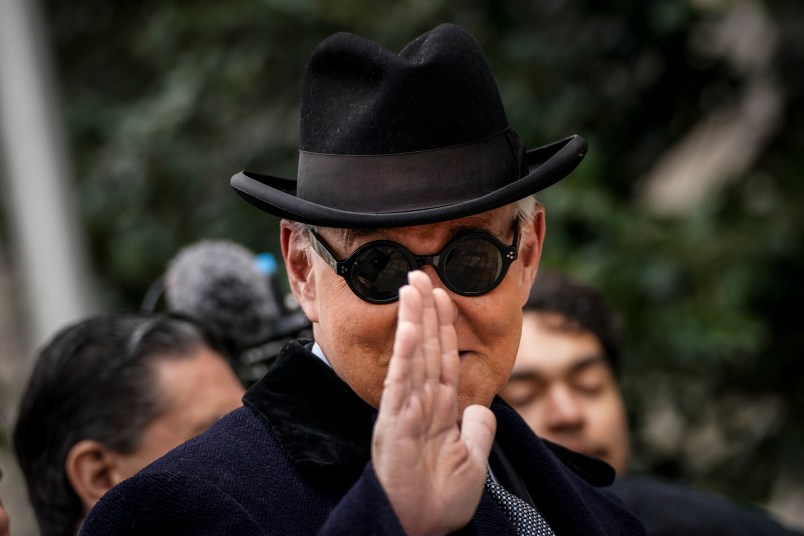In a remarkable hearing Tuesday, three members of Roger Stone’s jury were brought in to testify about claims Stone has made about juror misconduct that he said warrants a new trial.
Judge Amy Berman Jackson said that she was doing this due to the “unprecedented, unique nature of the situation,” and she explained that she was taking extra precautions to protect them, after President Trump had publicly shone a “spotlight” on the allegations.
She questioned specifically the foreperson who Stone has targeted with his claims of misconduct. The judge also brought in two other jurors to weigh in on some of Stone’s allegations.
Both of the jurors praised the foreperson’s handling of the deliberations, and denied witnessing any episodes of a juror trying to dominate the jury deliberations. The foreperson defended the answers she gave during the jury selection process — including about her social media posts — that Stone is now claiming were dishonest.
“I was giving the best answer I could,” the foreperson said, after Stone attorney Seth Ginsburg badgered her about several posts on her social media accounts that were critical of the President.
On the questionnaire, the foreperson had said she couldn’t remember if she had posted publicly about Stone, the House Intelligence Committee, or the special counsel investigation, but suggested it was possible she had shared a related article on social media.
“It is why I did not check yes or no because I did not want to be deceptive,” the foreperson said, defending the answer. “I don’t have a memory of every tweet or share that I’ve done.’
Throughout the proceedings, the judge appeared to be deeply skeptical of Stone’s allegations. Nonetheless, she said she was bringing the foreperson in to “give her an opportunity to get to the bottom of those allegations.” She also indicated an interest in the record of the matter she was creating, in case her final decision was appealed.
Stone filed the motion for a new trial under seal just days before he was sentenced to three and half years for lying in the House’s Russia probe. While the details of his official allegations had not been publicly disclosed prior to Tuesday’s hearing, there was speculation that Stone had targeted the foreperson, who got media attention for a recent social media post defending the prosecutors in the case. Once the foreperson was identified, she quickly found herself in the crosshairs of Trump’s allies because of her previous political ties to the Democratic Party and her several anti-Trump posts on social media.
Trump has amplified those allegations by accusing her publicly of bias.
At Tuesday’s proceedings, two other members of Stone’s jury — referred to as only Juror A and Juror B — provided no evidence that the foreperson had acted inappropriately in her role.
The foreperson “absolutely” treated the rest of the jury with respect and civility, Juror A testified. Meanwhile, Juror B revealed that it was the foreperson who suggested during deliberations the jury slow down and look at one of the counts against Stone more closely.
Neither of the two witnesses had said they saw a juror inappropriately discussing with other jurors the case or the news around it in violation of the judge’s rules for the trial — debunking another speculative claim that Stone had apparently made in his bid for a new trial.
The foreperson also denied violating the judge’s rules about avoiding news about the trial.
Stone’s gambit appears aimed at getting the attention of the President who many believe will ultimately pardon his longtime friend.
Before the jurors were brought in for their questioning, Stone’s attorneys admitted that they did not Google the names on a list of potential jurors that was provided to them during the juror process.
Stone attorney Robert Bushel confirmed that the team had not taken this step. The judge noted that it was “regular practice” for parties to use so-called jury panel lists to do internet research on potential jurors that could be sat for trial.
Berman Jackson also grilled Stone’s team on what social media postings in particular they believed showed that the foreperson had lied on the written questionnaire.
Stone attorney Seth Ginsburg identified just two posts on the foreperson’s media accounts that were directly related to Stone. But they claimed that her anti-Trump tweets were also relevant since Stone was a prominent supporter of the President’s — an argument that appeared to not go very far with the judge.
Before the jurors were brought forward, Berman Jackson pressed Ginsburg for evidence that the foreperson lied on the questionnaire, instead of focusing on whether she was “a dyed in the wool Democrat and probably wouldn’t like Mr. Stone if she met him.”
The judge also repeatedly interrupted Ginsburg’s questioning of the juror’s anti-Trump social media posts to encourage him to focus on the content directly relevant to the Stone case.
The judge did invoke Trump — and his recent attacks against the juror — in a preliminary portion of Tuesday’s hearings, when she explained why she was placing certain limitations on the public access to the proceedings. Before the jurors were brought in, the courtroom was cleared out and the proceedings could only be followed by an audio feed broadcasting elsewhere in the courthouse. She also barred the parties from referring to the jurors by name or their juror number.
“This is a highly publicized case, and in a highly polarized political climate in which the president himself has shone a spotlight on the jury through his Twitter platform,” the judge said, while also calling out Tucker Carlson, Alex Jones, and others on the right for their allegations about the jury.
At the end of the hearing, the judge did not make a ruling on Stone’s request from the bench, and said she was taking the matter “under advisement.”
This post has been updated.



